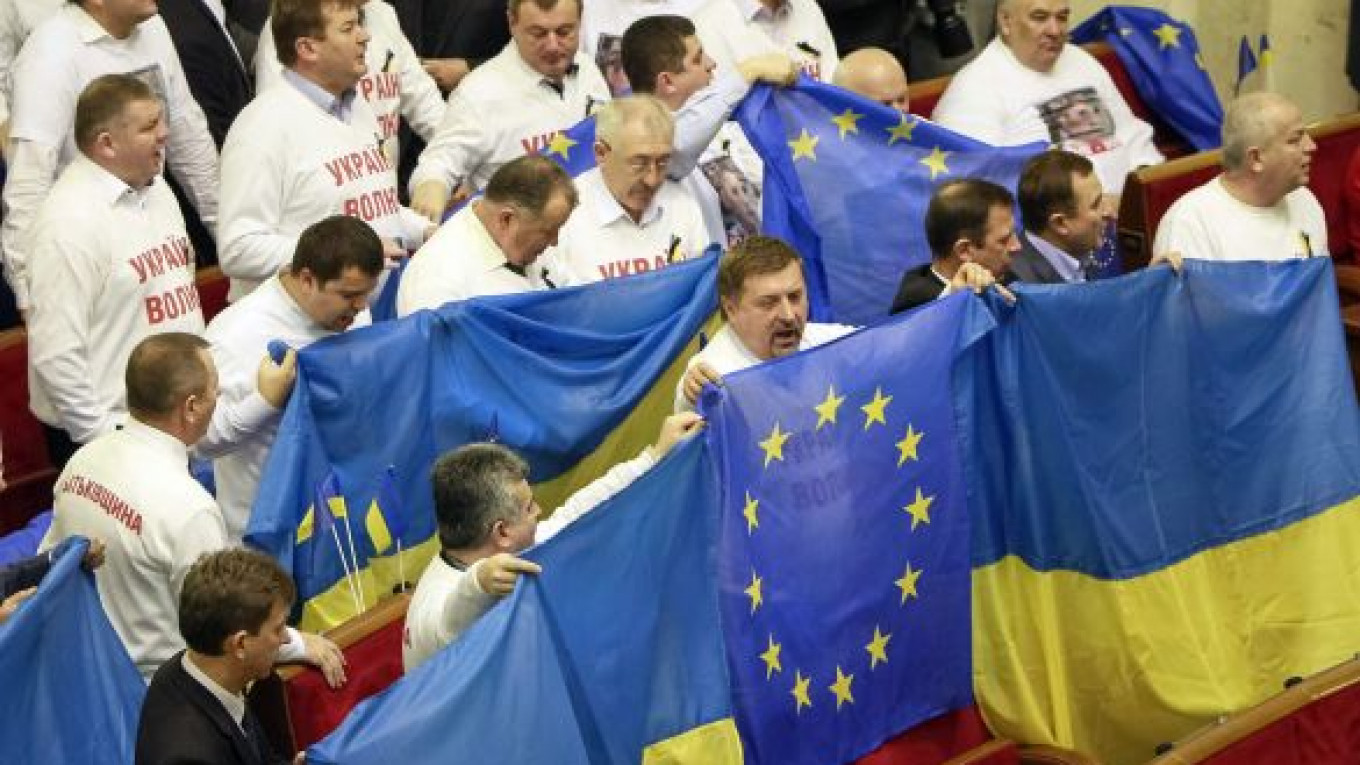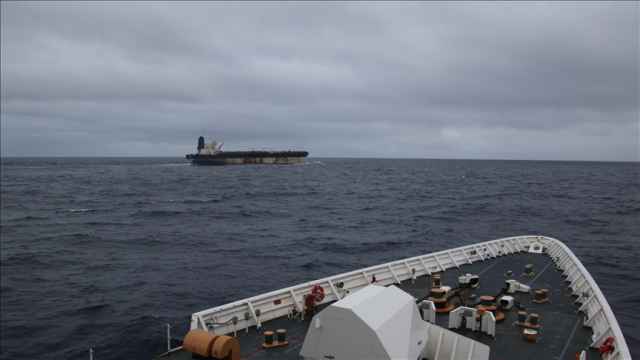BRUSSELS — In post-Soviet Europe, Russia looks to have won a decisive victory by convincing Ukraine to reject a trade deal with the European Union and deepen ties with Moscow instead.
But the EU has reason to breathe a sigh of relief, too.
Once any sense of rejection or thwarted ambition passes, the reality remains that taking Ukraine under its wing — a highly indebted country of 46 million people stricken by corruption and unpredictable politics — could have proven a costly and difficult burden for the EU, at least in the short-term.
And in the longer-term, it remains possible that Ukraine will turn its gaze back to the West and seek to reopen talks on deeper EU trade and political ties, although that is now unlikely to happen until after Ukrainian elections in 2015.
In explaining its decision to reject the deal, due to have been signed at a summit in Vilnius next Friday, Ukraine's prime minister put it down to economic pragmatism, and sought to keep alive the idea of strategic ties with the EU in the future.
"The decision the government has made is based on economic reasons," Mykola Azarov told parliament on Friday, a day after he stunned many by rejecting the deal. "It is of a tactical character and does not change our strategic objectives."
At the same time, the EU's foreign policy chief, Catherine Ashton, was careful to keep the hand of cooperation extended to Ukraine, in case Kiev changes its mind down the line.
"We believe that the future for Ukraine lies in a strong relationship with the EU," she said in a statement on Thursday, acknowledging Ukraine's rejection and warning about the impact it is likely to have on foreign investment in Ukraine.
"We stand firm in our commitment to the people of Ukraine, who would have been the main beneficiaries of the agreement."
A spokeswoman for the European Commission, Maja Kocijancic, said: "Ukraine was not a prize to be won. It was a relationship we started to build a long time ago."
Risky Prize
Since the launch of its Eastern Partnership program in 2009, a plan to forge closer ties with six former Soviet states, the EU has expended a lot of time, money and diplomatic effort in trying to bring the countries closer into its fold.
Of the six, Ukraine, with its rich mineral resources, vast land mass bordering four EU member states and annual output of more than $300 billion, was always the biggest prize.
But being close to Russia, which regards Ukraine as culturally its own and maintains close links to the country, especially the Crimea region, it was also a risky prize.
For that reason, as much as the EU played up the economic, trade and socio-political advantages of an association agreement with Kiev, it was really about geopolitics.
"The EU always saw itself as someone that was not in to playing geopolitical games," said Ulrich Speck, a visiting scholar at Carnegie Europe, a think tank.
"But the irony is that [President Vladimir] Putin's new assertiveness forced the EU into playing power politics, so this has become largely a geopolitical game."
Had the EU won the game, it might have proven an uncomfortable victory, at least in the short-term.
Not only was Russia threatening to cut off gas supplies to Ukraine, which would have meant the EU having to find a solution, but Ukraine's currency is being artificially propped up, its debt is rated "junk" and it is battling to agree a financial aid package with the IMF.
What's more, the EU had set three "benchmarks" for Ukraine to meet before signing the deal, including putting an end to "selective justice," symbolized by the imprisonment of former Prime Minister Yulia Tymoshenko.
Even if the EU and Ukraine had gone ahead and signed the deal in Vilnius next week, the likelihood is that Tymoshenko would have remained in custody, at least in the short-term. That would have been a stain on the EU's conscience, a troubling issue many EU diplomats were struggling to ignore.
With the deal now off, the EU no longer has to worry about having to look away from gaps in Ukraine's justice system, its politics and corruption. Ukraine is now Moscow's problem. It still owes Russia's Gazprom nearly $1.3 billion in unpaid bills.
Still, on the EU side, there is a sense of having been outmaneuvered by Moscow and of having been naive.
One EU foreign minister said the EU had been misled by politicians who had no interest in a European future but were playing Russia and Europe off against one other and selling Ukraine to the highest bidder.
With Tymoshenko — Ukrainian President Viktor Yanukovych's personal nemesis and potential challenger in 2015 — remaining behind bars and no obligation to clean up politics and corruption in the way the EU deal would have demanded, Yanukovych's re-election may be more likely.
Russia, too, may feel more inclined to throw its weight — and that of Russian-speaking voters in Ukraine — behind the president, securing him another five-year term.
At that point, after 2015, he may turn his focus back to Europe and see what options there are for reopening talks, especially if he is to satisfy the majority of voters, who say they want Ukraine to have closer ties to the EU.
"Ukraine may continue to balance Russia and the EU, and both may continue to try to bring Ukraine into their sphere, the Kremlin with threats and the EU with attraction," said Speck.
"Both integration paths have strings attached that may be simply unacceptable to Yanukovych. But both are unlikely to compromise on what they consider their core interests."
Facts about Ukraine's ties with Russia and Europe
Ukraine has spurned a new alliance with its western neighbors, suspending a trade pact with the European Union and reviving talks on a deal instead with Russia, its old Soviet master.
However, a highly indebted country of 46 million people stricken by corruption and unpredictable politics could have proven a costly and difficult burden for the EU.
Here are some facts about Ukraine's economy and its trade and energy relationship with Russia and Europe:
ECONOMY
* Ukraine, with its rich mineral resources, large land mass bordering four EU member states and annual output of more than $300 billion, is an attractive trading partner to both Moscow and Brussels. However, Ukraine's government has heavy financing needs in the coming 18 months and must find more than $17 billion next year to meet gas bills and debt repayments.
* Including the private sector, Ukraine faces debt repayments of more than $60 billion, or a third of the country's gross domestic product (GDP), in the coming year, Central Bank data showed.
* Ukraine's sovereign debt yield premium to U.S Treasuries stands at 923 basis points, the highest in the world after Venezuela. This prices the risk of default.
Investors' fears are reflected by the fact that debt maturing next year carries higher yields than longer-dated debt.
ENERGY
* Ukraine imports nearly all its gas from Russia and is also the major transit route for Russian gas to the EU. The EU depends on Russia for about a quarter of its gas, about half of which passes through Ukraine.
* Russia has sought to reduce its dependence on Ukraine as a transit nation, while the EU is seeking alternative sources of gas supply. Russian gas giant Gazprom has built the Nord Stream pipeline into Germany, bypassing Ukraine, and is now working on South Stream, which would export Russian gas into southern and eastern Europe, again avoiding Ukraine.
* Compared with January 2009, when gas was cut off to some EU customers, the EU is much better protected against disruptions. EU law now requires states to keep gas in storage.
TRADE
* Ukraine's economy relies on exports of steel, chemicals and grain. More than 60 percent of its exports go to the former Soviet market, with Russia, Belarus and Kazakhstan the most important.* However, Ukrainian big business sees greater prosperity in Europe, and until this week Kiev had resisted joining Russia's new Customs Union, which already comprises several other former Soviet republics.
Joining the Moscow-led Customs Union would be incompatible with a free-trade deal with the EU because no country can be a member of two separate trade blocs.
* The 28-nation EU, which buys about a third of Ukraine's exports, negotiated a free-trade deal with Kiev between 2008 and 2012. But this never came into force because the EU set Ukraine three "benchmarks" to meet before signing the accord.
These included putting an end to "selective justice", symbolized by the imprisonment of former prime minister Yulia Tymoshenko.
— Reuters
A Message from The Moscow Times:
Dear readers,
We are facing unprecedented challenges. Russia's Prosecutor General's Office has designated The Moscow Times as an "undesirable" organization, criminalizing our work and putting our staff at risk of prosecution. This follows our earlier unjust labeling as a "foreign agent."
These actions are direct attempts to silence independent journalism in Russia. The authorities claim our work "discredits the decisions of the Russian leadership." We see things differently: we strive to provide accurate, unbiased reporting on Russia.
We, the journalists of The Moscow Times, refuse to be silenced. But to continue our work, we need your help.
Your support, no matter how small, makes a world of difference. If you can, please support us monthly starting from just $2. It's quick to set up, and every contribution makes a significant impact.
By supporting The Moscow Times, you're defending open, independent journalism in the face of repression. Thank you for standing with us.
Remind me later.






